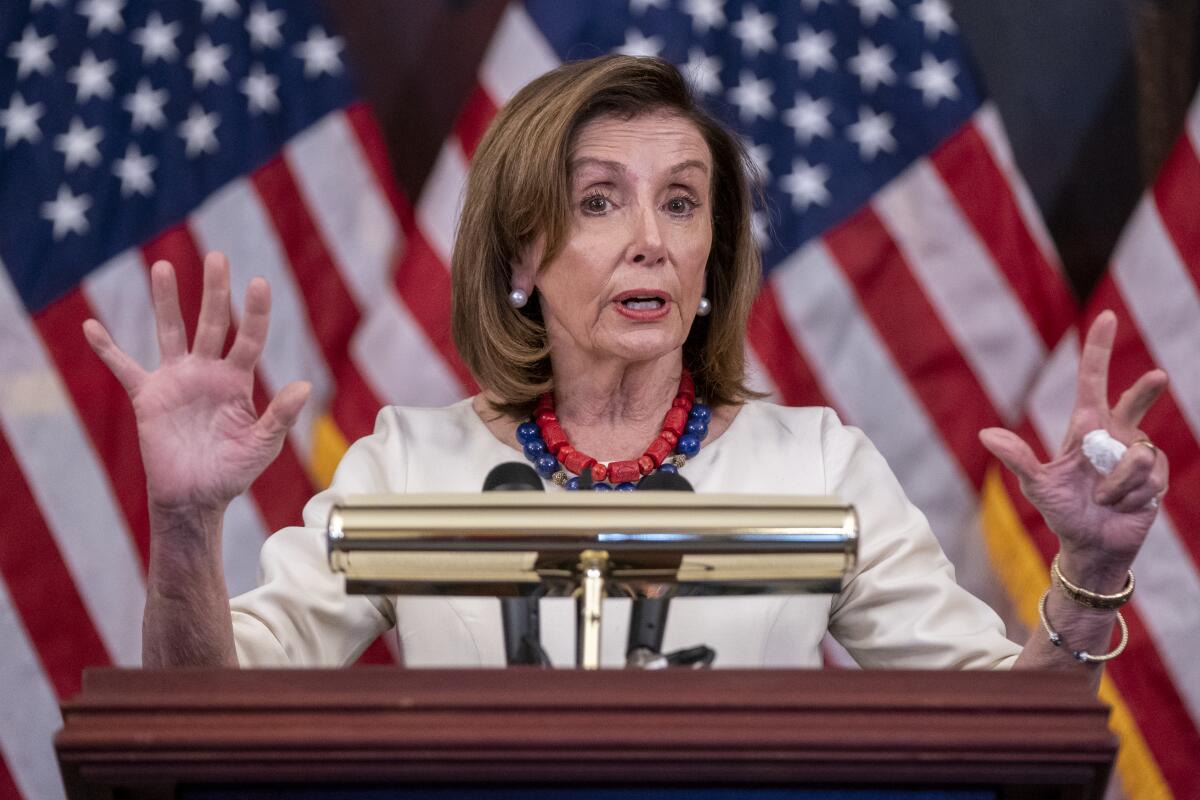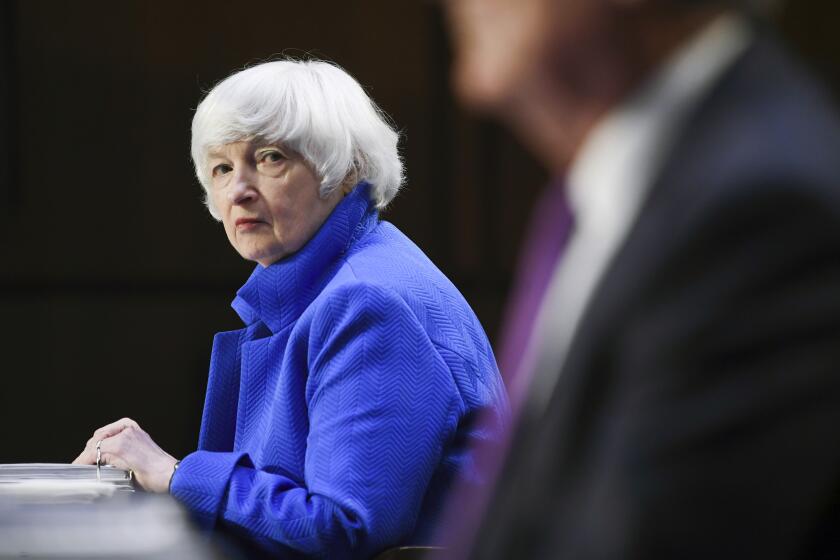Column: Ban congressional stock trading, but don’t stop there

- Share via
One wonders whether Rep. Mike Kelly (R-Pa.) has come to regret the financial killing his wife made in shares of the steel company Cleveland-Cliffs last year.
According to public filings, Victoria Kelly’s trading turned a profit somewhere between $28,000 and $137,500 in less than a year.
The trading, however, turned her husband into a poster child for the potential conflicts of interest that can arise from congressional members’ unrestricted stock trading, and also earned him an investigation by congressional ethics officials.
“If members want to do that, I’m OK with that.”
— House Speaker Nancy Pelosi, yielding on restricting congressional stock trading
They found there was “substantial reason to believe” that the trading was triggered by nonpublic information Kelly acquired, and that it may have violated ethics rules and federal law. The case is still pending.
In the wake of the Kelly accusations and a host of other suspect trading by members of Congress and their staffs, interest in tightening up rules on congressional securities trading has spiked on Capitol Hill. The most far-reaching proposals would ban trading in stocks and other securities entirely.
Get the latest from Michael Hiltzik
Commentary on economics and more from a Pulitzer Prize winner.
You may occasionally receive promotional content from the Los Angeles Times.
That would be a good move. It would remove one major source of conflicts of interest for lawmakers and might be a step toward raising Congress’ public standing, which has been drifting into the muck for years.
But let’s face the facts: It might lop off the tip of the iceberg of congressional conflicts of interest, but would do almost nothing about the rest of the iceberg of illicit influence peddling in Washington. Addressing that would require dramatic reforms in laws governing lobbying and campaign finance, which are never on the table.
For lawmakers, restrictions on stock sales may even be useful in diverting public attention from those other sources of influence, which for the average senator or congressman may be even more lucrative in the long term, such as promises of employment following congressional service. So restrictions on stock trading may be all we get just now.
Stock trading may have become a particular focus of public ire both because individual stock trading is a fairly alien practice for the average American household, and because it symbolizes the pursuits of the wealthy.
Goldman Sachs, Comcast, AT&T and others are quietly supporting attacks on abortion and voting rights.
That makes the objection raised by one Republican, Rep. Patrick T. McHenry of North Carolina, sound loopy. McHenry, the ranking GOP member of the House Financial Services Committee, told Politico on Wednesday that he opposes a ban because “it’s a terrible idea to remove lawmakers from society.”
If McHenry genuinely believes that stock trading is what makes lawmakers sensitive to the concerns of their fellow Americans, he must be genuinely out of touch. He said he would be offering his own proposals sometime soon.
That said, the pressure for some level of restriction may be turning into a juggernaut, as my colleague Jennifer Haberkorn has reported.
On Jan. 20, House Speaker Nancy Pelosi (D-San Francisco) softened her longtime opposition to new trading restrictions: “If members want to do that, I’m OK with that,” she said. Bipartisan bills have been introduced in both chambers, bowing to opinion polls signifying that the public believes lawmakers have an unfair advantage in picking stocks.
The very idea that lawmakers should be able to exploit their official positions for personal financial gain grates on voters, as it should.
“Voters have a right to know that their elected officials have the public interest in mind, and not their personal interest,” Kedric Payne, senior director of ethics at the Campaign Legal Center, told me. “With unrestricted stock trading, we know that the public loses confidence in their elected officials.”
Several recent cases have underscored that reality.
Ethics investigators determined that Victoria Kelly, Rep. Kelly’s wife, bought between $15,001 and $50,000 of stock in Cleveland-Cliffs, a steelmaker with a plant in Kelly’s home district near Erie, Pa., on April 29, 2020.
That was the very day after Kelly’s congressional office was informed that the Commerce Department was poised to make an announcement on steel tariffs that would directly benefit the company, and that Kelly had lobbied for.
Victoria Kelly bought the shares for about $4.70 each and sold them for about $18.11 the following January. She, her husband, congressional staffer Matt Stroia and then-Commerce Secretary Wilbur Ross all refused to cooperate with the investigation, ethics investigators said.
When Democrats run away from their programs, they lose elections.
Other trading scandals erupted during the pandemic.
Former Republican Sens. David Perdue and Kelly Loeffler of Georgia or members of their households were found to have sold millions of dollars in shares around the time that they may have been privy to briefings about the pandemic’s economic consequences. Loeffler’s husband, Jeffrey Sprecher, is chairman of the New York Stock Exchange.
Both politicians were defeated in their runoff races for the Senate last year, after their opponents used their stock trading against them. But Justice Department investigations of both were eventually dropped.
Sen. Richard M. Burr (R-N.C.) abruptly sold $1.65 million in shares — almost his entire portfolio — on Feb. 13, 2020, shortly after he received classified briefings suggesting a dire pandemic outlook for the U.S.
Among the companies he unloaded were some that would be especially vulnerable to a pandemic downturn, including hotels and resorts. Within a week of Burr’s sales, the stock market began a steep drop on pandemic news, with the Standard & Poor’s 500 index falling about 33% by March 20.
(If Burr didn’t return to the market, he missed out on a strong recovery: The S&P 500 made up its losses by mid-August 2020 and closed the year with a gain of more than 18%. In other words, Burr would have been well-advised to sit tight instead of selling.)
A criminal investigation of Burr’s trading was closed by the Department of Justice in January 2021, but a Securities and Exchange civil investigation of trading by him and his brother-in-law appears to be yet unresolved. Burr chose not to run for reelection this year.
The spotlight has landed on other wealthy lawmakers, including Sen. Dianne Feinstein (D-Calif.). Feinstein placed her assets in a blind trust when she joined the Senate in 1992. Her husband, investor Richard Blum, is a vigorous stock trader. The Justice Department investigated Feinstein’s trading in 2020, but ultimately dropped the case.
President Biden wants to step up the war on tax cheats, so of course the GOP and banks object.
Rep. Ro Khanna (D-Fremont) landed atop a list of frequent traders in 2021, with nearly $53 million in total purchases and sales. But Khanna’s office explained that the transactions occurred in his wife’s portfolio, which was assembled before their marriage and is managed by an outside advisor. “No trading is done through joint accounts,” Khanna’s spokeswoman said.
Pelosi apparently does not trade stocks herself, but has reported holdings attributed to her husband, Paul, an investment manager, including shares and derivatives of numerous companies subject to government oversight in one form or another, such as Amazon, Apple and Alphabet (the parent of Google).
Whatever the explanations, the scale and timing of congressional trading and the potential for abuse are evident. The question is how best to address this.
It’s obvious that the Stop Trading on Congressional Knowledge, or STOCK, Act of 2012, which was enacted in response to an earlier outbreak of financial scandals, is an ineffective countermeasure.
The act followed the traditional trading enforcement model of relying on disclosure to quell wrongdoing; generally it requires public disclosure of stock trades within no more than 45 days of the transaction. The reports only have to identify transaction amounts in broad ranges, not by specifics. The act doesn’t ban trading, unless it’s based on nonpublic information gained through a member’s or staffer’s official duties. That’s a nebulous standard at best.
The measure’s disclosure provisions “make the problem worse,” Payne argues. “It shows you the conflicts of interest and potential occurrences of insider trading, with no way of dealing with them. It’s like a doctor prescribing X-rays for a patient. X-rays can help diagnose a problem, but you can’t use an X-ray as a treatment. The STOCK Act shows us the amount of trading that’s going on and the types of trades that are going on. Now what are we going to do about it?”
Stock prices aren’t relevant to most people’s lives, so why do we care so much about the markets?
What, indeed? Even assuming that some kind of ownership or trading restriction gets passed this year, the options are almost limitless.
It’s possible to design a bill with so many subtle loopholes that it’s essentially ineffective. Should spouses and dependent children be included? Parents? Adult children? (Any of them could be recipients of useful and tradable confidences.) How should existing holdings be treated? And what are the penalties?
That last point is crucial. The penalties in the STOCK Act are so risibly meager — up to $200 per violation, which can be waived by ethics officials — so meager that the regulation has been routinely flouted by scores of members of Congress and their staff members.
The strictest proposal currently on the table appears to be the one introduced Wednesday by Sens. Elizabeth Warren (D-Mass.), Steve Daines (R-Mont.), Marsha Blackburn (R-Tenn.) and Debbie Stabenow (D-Mich.) and Reps. Pramila Jayapal (D-Wash.) and Matthew M. Rosendale (R-Mont.).
As Warren’s office described the measure, it would ban the ownership or trading by members of Congress and their spouses of “individual stocks, bonds, commodities, futures, and other securities including an interest in a hedge fund, a derivative, an option or other complex investment vehicle.” Broad-based mutual funds such as index funds, Treasury securities and investments held in a government retirement fund would be exempt.
Members would have six months to sell any existing securities holdings and five years to unload interests in hedge funds or venture funds. They’d be insulated from capital gains taxes the same as executive branch appointees forced to sell investments that might present a conflict.
Those taxes are deferred to the extent the gains are promptly reinvested in permissible assets such as broad mutual funds or Treasury securities; only when the successor investments are sold do the capital gains taxes kick in.
The penalties would be steep: up to $50,000 per violation.
Somewhat more indulgent is a proposal introduced last month by Democratic Sens. Jon Ossoff of Georgia and Mark Kelly of Arizona. Their bill would give members the option of divesting assets or placing them in a blind trust — that is, a trust under the control of an independent overseer who would have no contact with or take instructions from the member. It would apply to spouses and dependent children.
Because the Ossoff-Kelly measure doesn’t provide for a divestment tax break, in effect it encourages members to opt for a blind trust.
The main problem here is that blind trusts aren’t always so blind. The starting portfolio would presumably be no secret to the members, and if they simply assume minimal trading within the trust, they could make assumptions about how their own activities might affect the portfolio.
“Listen, you put your assets in a blind trust, you’re still aware of what assets were put in that blind trust,” Daines said, rightly, upon the introduction of his and Warren’s stiffer bill.
Penalties for violations of the Ossoff-Kelly bill would top out at one month’s congressional salary, or $14,500 for rank-and-file members, who collect $174,000 a year, and up to $18,625 for the House Speaker, whose annual salary is $223,500.
It’s likely to be months before a final version jells on Capitol Hill. Whether Congress carves out enough loopholes to make that version little more than window-dressing, or shows that it’s serious about shutting down at least this one form of legalized profiteering, is impossible to say just yet. Not only the public interest is at stake; the reputation of Congress hangs in the balance, too.
More to Read
Get the latest from Michael Hiltzik
Commentary on economics and more from a Pulitzer Prize winner.
You may occasionally receive promotional content from the Los Angeles Times.















